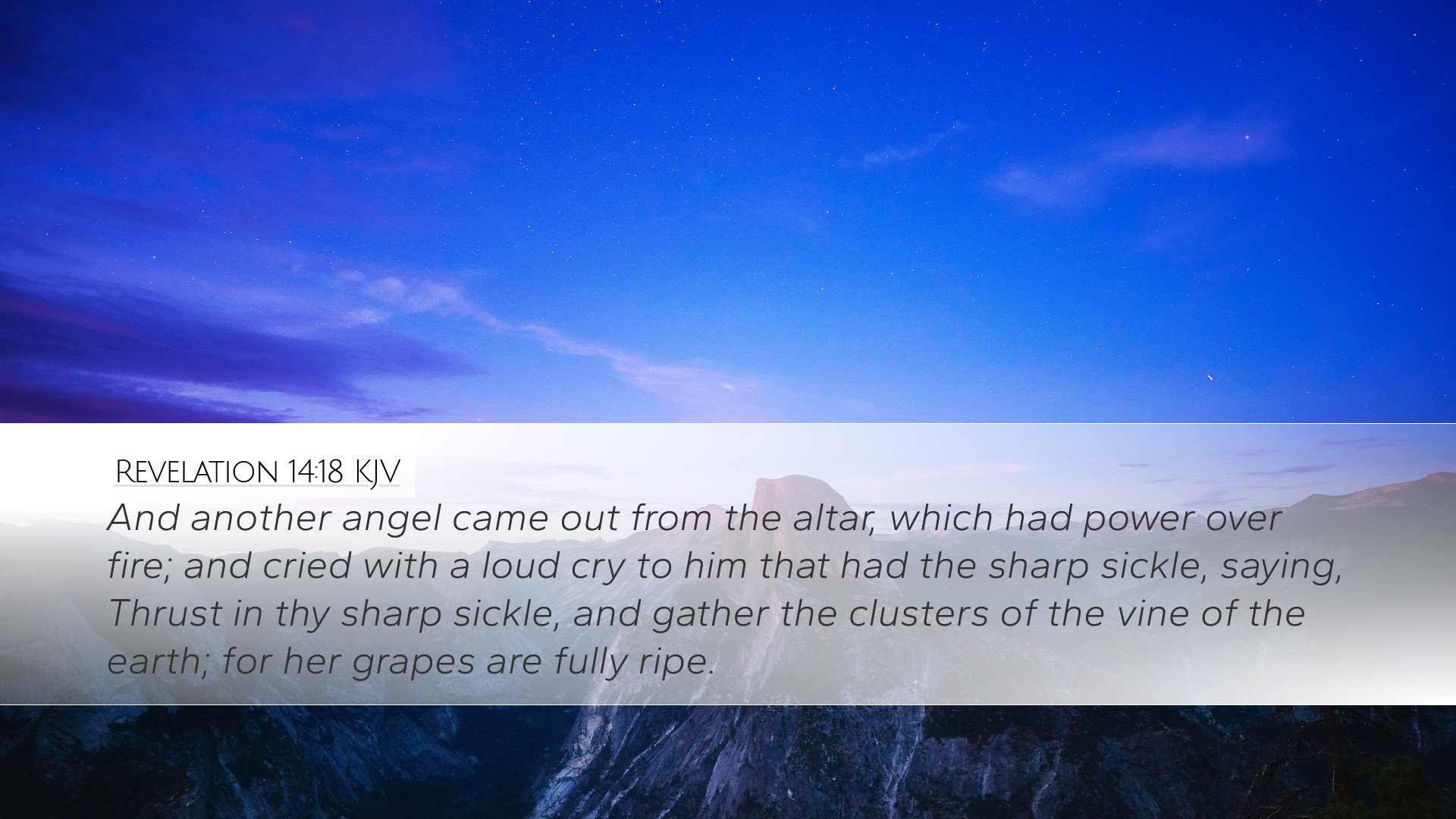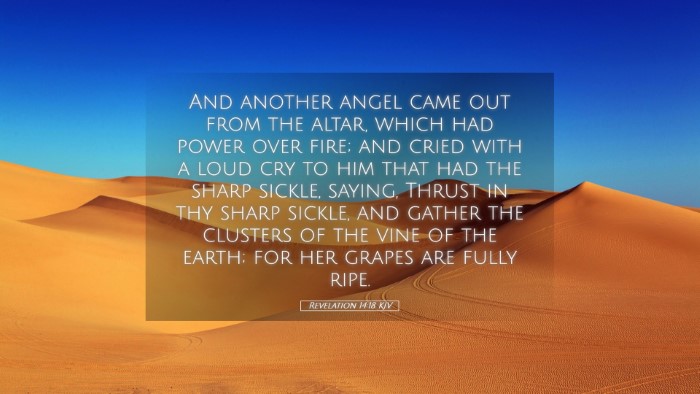Bible Commentary on Revelation 14:18
Verse Reference: Revelation 14:18 - "And another angel came out from the altar, which had power over fire; and cried with a loud cry to him that had the sharp sickle, saying, Gather the clusters of the vine of the earth; for her grapes are fully ripe."
Overview
This pivotal verse occurs within a symbolic and prophetic context rich with imagery and meaning. Revelation 14 reveals the significant events that unfold during the end times, particularly the divine judgment and the final gathering of God's people. The verse utilizes agricultural symbolism to convey deeper truths about judgment and divine sovereignty.
Contextual Background
The book of Revelation, authored by John, employs complex symbols and apocalyptic literature's stylistic elements to reveal God's ultimate plan for humanity. This passage comes after the depiction of the 144,000 redeemed from the earth and the proclamation of the fall of Babylon, indicating a transition into the final judgment of the world.
Key Themes and Symbolism
- The Angel from the Altar: The angel's origin from the altar signifies a connection to divine authority, possibly linking back to sacrificial themes associated with atonement. This conveys the holiness of God's judgments stemming from His redemptive purpose.
- Power over Fire: Fire is a potent symbol in biblical literature, often representing judgment, purification, and the presence of God. The angel's authority over fire underscores God's power in executing judgment as well as refining His people.
- The Sharp Sickle: The sickle represents impending harvest and judgment. The gathering of the 'clusters of the vine' suggests the separation of the righteous from the unrighteous, underscoring the urgency of God's impending judgment.
Insights from Commentaries
Matthew Henry's Commentary
Matthew Henry emphasizes the significance of the angel's cry and the imagery of the harvest in this verse. He notes that the gathering of the grapes illustrates God’s judgment upon the wicked, paralleling other biblical harvests where the righteous are separated from the unrighteous. This is a time when God's patience has been exhausted, marking a culmination of His long-suffering dealings with humanity.
Albert Barnes' Notes
Albert Barnes elaborates on the concept of gathering the 'clusters of the vine.' He interprets the vine as a metaphor for the world, where the 'clusters' symbolize those whose sins have reached their fullness. Barnes suggests that this gathering is not just for punishment but serves a dual purpose—the vindication of God's justice and the salvation of His people. The fullness of the grapes indicates that those being judged have exceeded the measure of God's mercy, emphasizing the seriousness of spiritual responsibility and the consequences of sin.
Adam Clarke's Commentary
Adam Clarke provides a theological reflection on the significance of the angel's command and the implications of the fully ripe grapes. He draws attention to the urgency and finality of the moment, wherein the cries from the altar suggest a divine mandate reinforced by the sacrifices offered for the sake of humanity. Clarke affirms the finality of God's judgment and the necessity of preparedness, as the time for reckoning has come.
Theological Implications
The theological implications of this verse are profound. Scholars agree that the gathering of the ripe grapes metaphorically indicates the judgment of those rejecting God’s providence and grace. It serves as a reminder of the return of Christ and the importance of living in light of His imminent return.
Lessons for Believers
- Awareness of Judgment: Believers are called to understand the realities of divine judgment and the importance of living righteously and in response to God’s grace.
- Call to Evangelism: The imagery compels Christians to evangelize, ensuring that the message of salvation reaches those whose time is not yet fulfilled.
- Hope in Sovereignty: Despite the harsh realities of judgment, there is hope in God's ultimate sovereignty and justice, assuring believers that evil will not prevail.
Conclusion
Revelation 14:18 stands as a powerful reminder of the eschatological truths that define Christian hope and call for righteous living. Combining insights from Matthew Henry, Albert Barnes, and Adam Clarke, it is clear that this verse emphasizes the culmination of a spiritual harvest, highlighted by God’s sovereignty and judgment. As pastors, students, and theologians reflect on this passage, they are offered both caution and encouragement—drawing believers to a deeper understanding of God's righteousness and the necessity of living faithfully in anticipation of His return.


